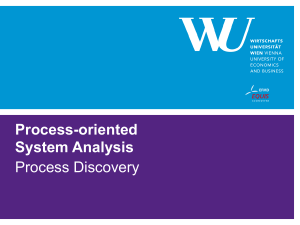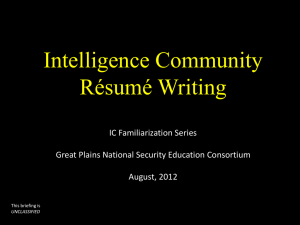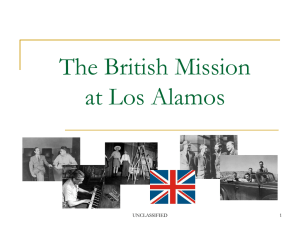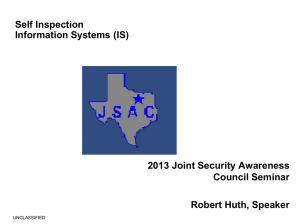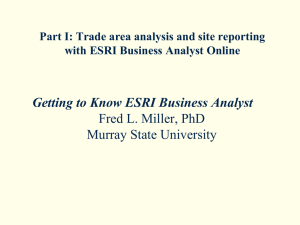UNCLASSIFIED - International Association For Intelligence Education
advertisement
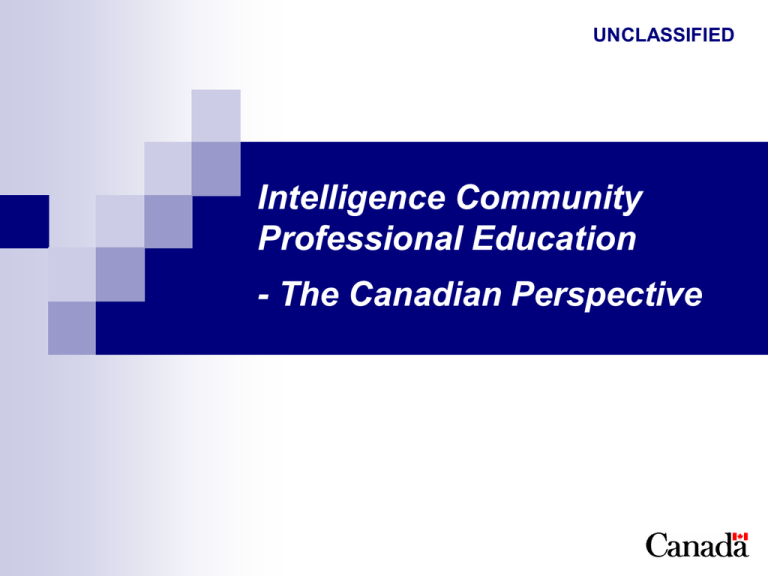
UNCLASSIFIED Intelligence Community Professional Education - The Canadian Perspective UNCLASSIFIED John Pyrik B.A. International Relations from UBC 15 years as a government investigator and analyst 3 years as chief instructor and manager of the Intelligence Analyst Learning Program (IALP) UNCLASSIFIED Professionalization A discipline is something that is formally taught, defined and recognized academically. It usually has sub-disciplines. Is intelligence a discipline, a field of study, a field of thought, or an object of study? Is it a profession? Well, at least we get paid! UNCLASSIFIED Professionalization A true profession is defined by a community of practice It distinguishes its members from the public at large (and from each other) by degrees of aptitude, and excludes those who do not meet set standards and ethics. To be a professional usually requires ongoing professional development programs as well as specialized journals for disseminating new knowledge and best practices. UNCLASSIFIED Formed in 2002, CAPIA was created to promote a sense of community amongst Canadian intelligence analysts and their managers. It also aims to set the standard for professional development in the intelligence analysis community in Canada. Awards Respice, adspice, prospice Code of Ethics UNCLASSIFIED Professionalization Intelligence Analyst Learning Program Began delivering courses in 2006 Self-funded / cost recovery 200+ students in 2009 / 2010 23 instructors (mainly sr. analysts) 7 courses (ELC, SAC, MIAC, AWC, TRAC) Staff of 3 (one permanent, 2 secondees) UNCLASSIFIED Professionalization Intelligence Analyst Learning Program has increased training resources for analysts; promoted best practices of intelligence analysis; and helped build a stronger intelligence community through integrated training. UNCLASSIFIED Typical Entry Level Course (ELC) 7 6 5 25 Students 4 3 9 Agencies 2 1 CFIA CIC PCO TC FINTRAC RCMP CSIS CBSA DND 0 Class Age Range Years 60 50 40 30 20 10 0 Students Job Titles Analyst (3) Bioterrorism Officer CI Intelex Unit Support Data Emergency Management Analyst HR Development Officer Human Resources Imagery Analyst (2) Intelligence Analyst (4) Senior Analyst (3) Senior Intelligence Analyst Senior Program Officer Strategic Analyst (4) Threat Assessment Coordinator UNCLASSIFIED Years of Experience 30 25 20 15 10 5 0 48 259 Years in current position Total years of service UNCLASSIFIED Nature of Work 100% 90% 80% 70% 60% 50% 40% 30% 20% 10% 0% Strategic Tactical Students UNCLASSIFIED Analysts are a diverse group! Organize Information Explain Evaluate Predict Intelligence Information Catalog Information Present Options Summarize Information Interpret Recommend? A real teaching challenge! Best Practices for Intelligence Analysts 1. Reflect on the problem, determining possible approaches. 2. Be resourceful and systematic when collecting information, documenting sources and noting caveats on usage. 3. Critically evaluate the quality of all information. 4. Develop multiple hypotheses / explanations. 5. Challenge assumptions, mindsets and biases. 6. Build collaborative networks. 7. Use structured analytic techniques. 8. Write clear, concise, well-documented, and client-focused reports. IACC Approved! UNCLASSIFIED Professionalization Intelligence Analyst Learning Program 2006 Course Review 2009 Key Competencies Study 2009 Program Evaluation 2009 New Funding Formula 2010 Needs Assessment 2010 Needs Assessment Survey The projected demand for training over the next three years is consistent with previous years. Stakeholders are generally comfortable with the existing content, format, and mandate of training, but … Some interest in blended learning, New training requested on writing, social network analysis, and classification, and strong consensus to develop a course for consumers of analytic products. 2010 Needs Assessment Survey Opportunities for contractors / academia? Survey respondents “definitely” wanted more advanced / in-depth training on: Intelligence Assessment Writing Briefing Critical Thinking Structured Analytical Techniques UNCLASSIFIED Questions? John Pyrik Chief Instructor & Manager Intelligence Analyst Learning Program 613 952-4871 jpyrik@bnet.pco-bcp.gc.ca


